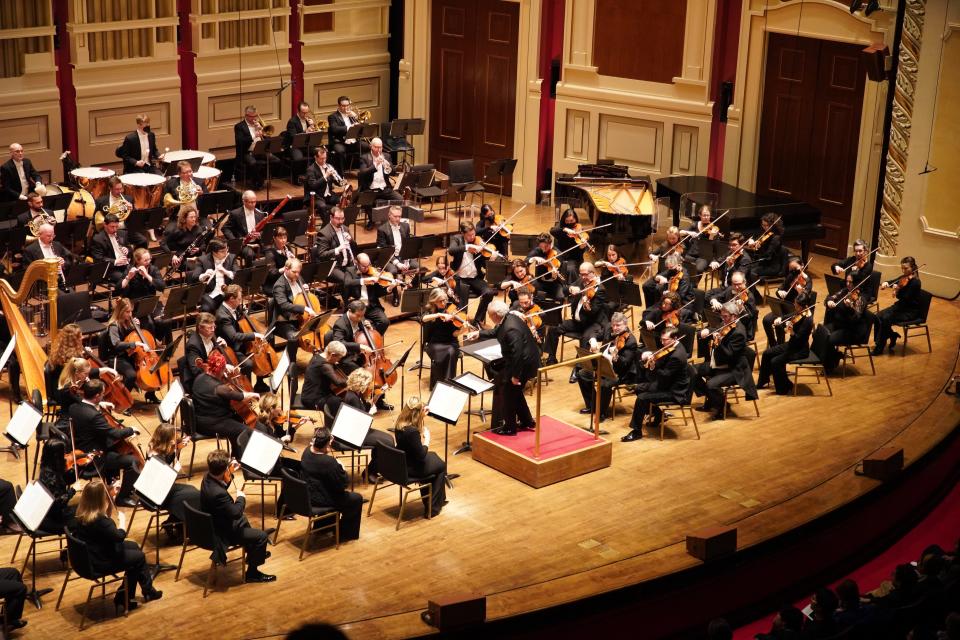Violins of Hope invites Pittsburgh area to project focused on unity & Holocaust lessons
PITTSBURGH ― Holocaust lessons and insights into perseverance await all who attend Violins of Hope Greater Pittsburgh's groundbreaking project starting in October.
Arts and community groups, religious and educational institutions, musicians and sponsors will partner on the Violins of Hope Exhibit at Carnegie Mellon University and at 60 related events in western Pennsylvania.
The campaign, subtitled "A Composition of the Human Spirit," underscores the depth and range of programming centered on unity.
On Oct. 7, the main Violins of Hope Exhibit, a treasured collection of string instruments played by Jewish musicians during the Holocaust, begins a seven-week run at CMU's Posner Center. Timed entry tickets for this free, one-of-a-kind experience are required and are now available through Nov. 21. Reserve tickets at violinsofhopepittsburgh.com/tickets-to-exhibit.
“These remarkable instruments, once silenced by the horrors of the Holocaust, now resound with stories of resilience, hope and the enduring power of music,” Sandy Rosen, chairperson of Violins of Hope Greater Pittsburgh, said in a press release. “We set out to create a community-wide initiative that uplifts and unites us, honoring the lives lost in the Holocaust and the musicians who found solace, inspiration and courage in their music at a time of immense anguish."

Their stories of hope and survival bring valuable lessons for today and future generations, organizers say. The event "comes at a time for compassion and unity as we approach the fifth year since the tragic massacre at the Tree of Life synagogue,” Rosen said. “Together, we are tuning out prejudice and building bridges that last.”
Violins symbolize hope
Embedded in Jewish culture long before World War II, the violin took on a new meaning and significance after the Holocaust. For some Jewish musicians, the ability to play a violin spared their lives in concentration camps and ghettos or helped their families escape Nazi tyranny. For others, music provided comfort amid unimaginable loss and suffering.
The Violins of Hope collection belongs to Israeli violin maker Amnon Weinstein and his son Avshalom, the descendants of Moshe Weinstein, a master luthier who fled Europe in 1938. Over more than two decades, they have located and restored nearly 100 surviving string instruments in tribute to 6 million Jews killed in the Holocaust, including their relatives. Today, Violins of Hope continues to be displayed and played across the globe.

Violins of Hope Exhibit in Pittsburgh
The CMU exhibit will showcase 21 string instruments accompanied by storyboards, photographs and videos documenting the Weinstein family and the Violins of Hope story, plus projected imagery of the Theresienstadt Orchestra from a propaganda film.
Docents will lead guided tours, providing the narrative for each instrument and an understanding of the role music played in the life of prisoners for survival or resistance. One story recounts a Jewish violinist who played at an Auschwitz death camp; others tell remarkable tales of violins passed down through generations as the sole remaining possession of a family member. Another set of traveling instruments will resound in concert halls from Pittsburgh and Wheeling, W.Va., to State College and suburban settings.
Violins of Hope Exhibit hours at the Posner Center will be 1-4 p.m. Mondays through Fridays; with 6-8 p.m. Wednesday evenings and noon to 4 p.m. Saturdays and Sundays.
Morning hours are reserved for school groups. Schools are encouraged to email info@violinsofhope.com to arrange group tours.
The Posner Center is located between the College of Fine Arts and Posner Hall, facing the university's tennis courts. Parking is available at the East Campus Garage on Forbes Street or along Frew Street, Tech Street., South Craig Street, Margaret Morrison Street, and the Schenley Park Visitor Center.
60 related events and closing concert
For details on more than 60 related exhibits, concerts, lectures, films, interfaith programs and a World Kindness Day Celebration, see the events calendar on violinsofhopepittsburgh.com. Locations range from the BNY Mellon Building and Pittsburgh Playhouse in downtown Pittsburgh, to the Byham Theater and Heinz Hall in the city's Cultural District, to Duquesne University and Robert Morris University's Wheatley Center, to the American Jewish Museum/Jewish Community Center in Squirrel Hill.
The project closes Nov. 25, with star violinist Joshua Bell joining Manfred Honeck and the Pittsburgh Symphony Orchestra for a concert inspired by hope and the power of the human spirit. Works will include Mendelssohn’s Violin Concerto in E minor, Ernest Bloch’s “Nigun” from Baal Shem, and a PSO commission by Israeli composer Boris Pigovat.

With presenting sponsor The Arthur J. and Betty F. Diskin Cultural Endowment Fund of the Jewish Federation Foundation and numerous community sponsors, Violins of Hope Greater Pittsburgh aims to reach a broad audience to reinforce lessons of acceptance, inclusion, and diversity through musical, educational and cultural events.
For more information, visit violinsofhopepittsburgh.com.
Scott Tady is entertainment editor for The Times and easy to reach at stady@gannett.com.
This article originally appeared on Beaver County Times: Violins of Hope brings powerful lessons on the Holocaust and unity

